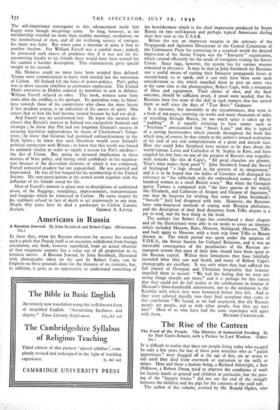Americans in Russia
A Russian Journal. By John Steinbeck and Robert Capa. (Heinemann. 21s.) IN these days, when the Russian obsession for secrecy has reached such a pitch that Pravda itself is on occasions withdrawn from foreign circulation, any book, however superficial, from an actual observer of that enigmatic country has a value out of all proportion to its intrinsic merits. A Russian Journal, by John Steinbeck, illustrated with photographs taken on the spot by Robert Capa, can be forgiven on these grounds alone for the thinness of its contents, but, in addition, it gives us an opportunity to understand something of the bewilderment which is the chief impression produced by Soviet Russia on two well-known and perhaps typical Americans during their first visit to the U.S.S.R.
Before the war an important weapon in the armoury of the Propaganda and Agitation Directorate of the Central Committee of the Communist Party for conveying to a sceptical world the desired impression of the Soviet Utopia was the " Intourist " organisation, which catered efficiently for the needs of foreigners visiting the Soviet Union. Since 1945, however' the system has for various reasons remained in abeyance. It may be that in John Steinbeck the Russians saw a useful means of cutting their Intourist propaganda losses at second-hand, so to speak, and it can only have been some such consideration as this which impelled them to give an entry visa at the same time to the photographer, Robert Capa, with a mountain of films and equipment. Their choice of men, and the final outcome, should be sufficient proof, if proof were needed, that the Russians have lost none of the skill in such matters that has served them so well since the days of "Tsar Boris" Godunov.
It is tiresome, but inevitable in the circumstances, that even in a book of zoo pages, covering six weeks and many thousands of miles of travelling through Russia, far too much space is taken up by "padding." It is equally irritating to have names such as " Svietlana " americaniscd into "Sweet Lana," and this is typical of a jarring facetiousness which extends throughout the book but which may, of course, be due simply to the author's inward realisation of his lack of any real comprehension of a great and ancient race. How else could John Steinbeck have written as he does about the world-famous Lavra and Cathedral of St. Sophia in Kiev, and have coupled his few lines on one of the greatest of Russia's war tragedies with remarks like this of Capa's, "All good churches are gloomy. That's what makes them good "? John Steinbeck found the Sword of Stalingrad "a little absurd in the poverty of its imagination," and it is to be hoped that the ladies of Coventry will disregard his reference to "the tablecloth with the embroidered names of fifteen hundred women in a small British town." But when the Georgian queen Tamara is compared with "the fairy queens of the world, like Elizabeth, and Catherine of Aragon and Eleanor of Aquitaine," one may be forgiven for wishing that some of John Steinbeck's " borscht " [sic] had disagreed with him. However, the Russians have time-honoured methods of coping with Western philistines, and the description of their final departure from Tiflis airport is a joy to read, and the best thirig in the book.
The authors (for Robert Cana has contributed a short chapter and all the illustrations) were able in six weeks to cover an itinerary which included Moscow, Kiev, Moscow, Stalingrad, Moscow, Tiflis and back again to Moscow, with a train trip from Tiflis to 13atum thrown in. The whole period was spent under the auspices of V.O.K.S., the Soviet Society for Cultural Relations, and it was an inevitable consequence of the peculiarities of the Russian air- transport system that most of their time should have been spent in the Russian capital. Within their limitations they have faithfully recorded what they saw and heard, and many of Robert Capa's photographs are excellent. It was only when they had suffered the full impact of Georgian and Ukrainian hospitality that honesty impelled them to record: "We had the feeling that we were not seeing things sharply any more," and it is perhaps for this reason that they could not do full justice to the celebrations in honour of Moscow's three-hundredth anniversary, nor to the invitation to the Kremlin with which they were honoured before they left. And as they were ushered dazedly into their final aeroplane they came to this conclusion "We found, as we had suspected, that the Russian people are people, and as with other people, that they are very nice." Most of us who have had the same experience will agree


































 Previous page
Previous page